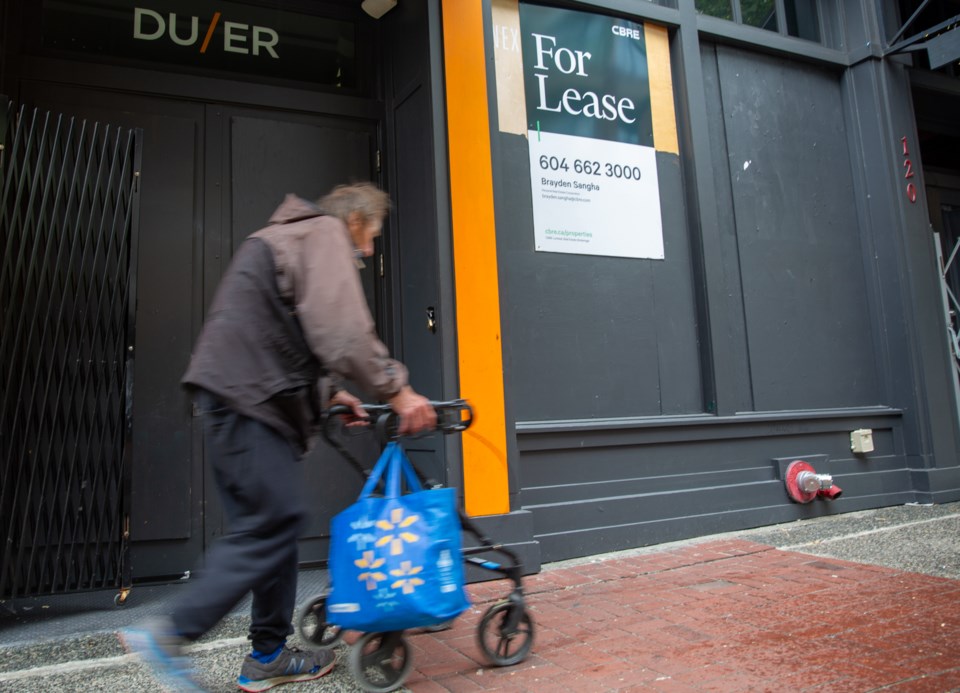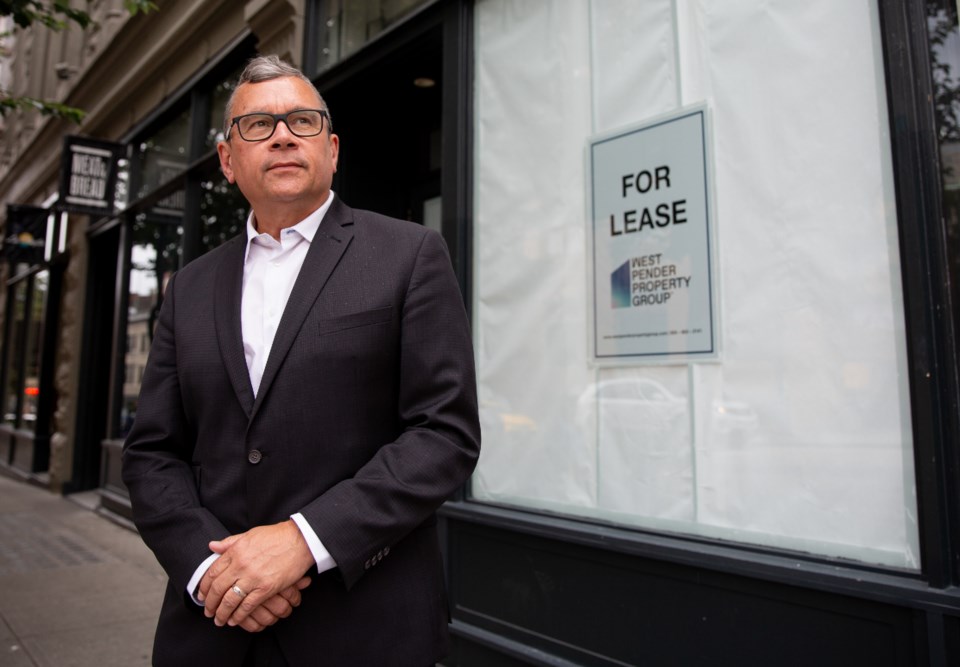Vancouver city council unanimously approved a motion Wednesday from Coun. Mike Klassen that aims to make it easier and faster for entrepreneurs, artists and others to move into the dozens of empty storefronts in the Downtown Eastside.
The motion is in response to Klassen hearing from business associations, building owners and people searching for affordable commercial space that it can take up to a year or more to get the doors open of a potential business or enterprise.
“Let's open the door to safe temporary activation of ground-level commercial units for up to 12 months without the need to permanently change use or zoning,” he said in introducing his motion in the council chamber.
City staff will now look to set up what Klassen described as a temporary occupancy pilot program that would apply to empty storefronts along the Hastings Street corridor and surrounding neighbourhoods such as Strathcona and Chinatown.
The program could be in place by October and expand to other areas of the city, including the downtown Granville Street strip, although an evaluation would first have to be completed of the 12-month experiment in the Downtown Eastside.
Vacancy rates are currently at more than 30 per cent in the Downtown Eastside, which has some of the cheapest rents in the city. Klassen acknowledged crime and street disorder is driving some of that vacancy, but so is red tape at city hall.

'Mind-numbingly difficult'
Council heard from Downtown Eastside property owner Edward von Dehn, who shared a story of a woman wanting to set up a hair salon in a building on East Hastings Street that was zoned for a retail business.
“It was just mind-numbingly difficult for her to get a [development permit], a [building permit], change of use and a business licence,” he said of what had already been a four-month process.
“In that time, she then gave up on the process. This is just one example of hundreds of examples…where owners cannot find tenants for their buildings.”
David Duprey, who leases space to artists and others in various buildings in the Downtown Eastside, provided another example to BIV where he wanted to turn a space for a pawn shop on West Hastings Street into a tattoo parlour.
“You'd think that that would be relatively easy, but that took me a year,” said Duprey, noting the slow process of working with various City departments to get the doors open.
“Every time you talk to somebody at city hall, it’s two weeks later before you get a reply. Then you have to do whatever they need you to do, and you get back to them another week later. So five conversations could take a month.”
'Facing a crisis'
Landon Hoyt, executive director of the Hastings Crossing Business Improvement Association, told council the Downtown Eastside has long been home for “resilience, creativity and innovation,” despite the significant poverty-related challenges.
The association represents more than 800 businesses and property owners.
“Right now, our commercial district is facing a crisis: over 30 per cent of ground-level storefronts sit vacant,” Hoyt said.
“Now that number is coming down—I'm happy to say—but we still face this crisis. These vacancies aren't just missed economic opportunities. They add to public safety issues, deter investment and reinforce the perception that this neighbourhood has been abandoned.”
Meanwhile, he said, there are entrepreneurs, artists, non-profits and community groups who want to activate these spaces, but are “blocked by red tape, high costs and complex permitting, in addition to all the challenges of opening a business these days.”
In an interview, Hoyt said he couldn’t provide a definitive number on what storefronts are renting for in the neighbourhood, but said good deals are to be had. He suggested online quotes of $50-70 per square foot is not what people necessarily pay.
“I know for a fact that people opening businesses are not always paying that because they're negotiating pretty heavily,” he said. “In reality, it's probably closer to the $25 to $40 a square foot sort of range.”
He named several well-known Vancouver businesses—Nuba, Nemesis, La Taqueria and others—that started up in the neighbourhood and have since expanded.
“They took a chance on this community and opened in an area that was a little more affordable to start a business,” said Hoyt, who helped Klassen draft the motion, which emphasizes an opening of a storefront would first need to be inspected for life-safety issues.
'Vital and timely intervention'
Coun. Sean Orr said he was first concerned the motion would lead to gentrification and speculation by property owners but added that he was “really impressed” with the initiative.
“This is a great way to activate more galleries and more spaces,” said Orr, noting he wants to see more Indigenous and “culturally appropriate” food uses open in the area. “Chinatown, I know, is losing a lot of the cultural food assets there.”
Klassen’s motion lists prospective tenants as artists, small business owners, social enterprises and community organizations. He mentioned graffiti artists Smokey D and the late Trey Helten in recognizing the need to accommodate the neighbourhood’s creative residents.
Council received a letter of support for the motion from Esther Rausenberg, the artistic director of the Eastside Arts Society.
“The DTES has long been a home for artists, makers, and cultural workers. Yet, ongoing real estate pressures and rigid permitting systems continue to displace creative persons and limit access to space,” Rausenberg wrote.
“We believe the proposed pilot represents a vital and timely intervention, offering a practical and community-led pathway to support cultural expression and economic inclusion.”
'Puzzled me'
The day before council approved the motion, BIV met with Klassen on West Hastings Street, near Victory Square, where there were noticeable “for lease” signs on storefronts in the area.
“This is not a gentrification process as much as a revitalization, and it allows people to come in here and start new businesses with lower risk and lower upfront costs,” he said.
When asked why people interested in renting a storefront can wait up to a year or more to get approval from the City, Klassen responded: “That's a good question, and it's something that's always sort of puzzled me. But what I really appreciate is just how comfortable staff are with this [motion].
“They know the pressure is on them to try and realize quicker business licence approvals and approvals of any kind, especially related to housing. We've got the right team in there right now who understands that we have to be able to deliver this more quickly. And this [motion], I think, is a great incentive for them to do that.”
X/@Howellings




